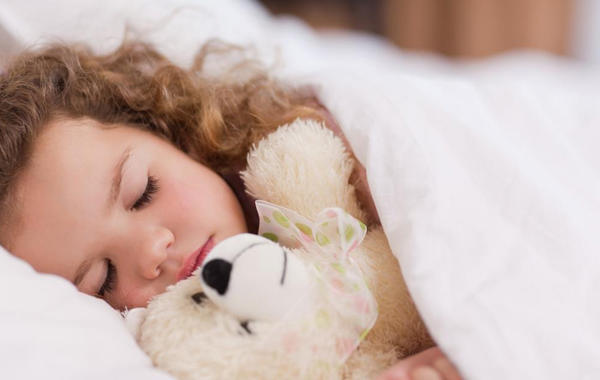Children sleeping: 5 mistakes we all make as parents that should be avoided

Putting your child to bed later on the weekend, letting go of your teenager’s sleep schedule, misidentifying signs of toddler fatigue… At each age, small errors can have serious consequences on the child’s sleep. Dr. Marc Rey, a neurologist, sounds the alarm.
In children, sleep does not come naturally as they grow older. It’s a learning process. “Sleep education is the responsibility of parents, but they don’t always know what to do,” says Dr. Marc Rey, a neurologist and president of the National Institute of Sleep and Alertness. At a symposium of the French Council of Associations for the Rights of the Child (Cofrade) in October, the expert warned that sleep is a family affair. Hence the need to know a few rules about sleep hygiene. A litany of common and easily modifiable errors in our habits.
Error #1: Lay off your child later on the weekend
Only 48% of children under 10 go to bed at the same time every day, and 53% of children under 3. On weekends, they go to bed at 9:24 p.m. on average, compared to 8:45 p.m. on weekdays. However, regular bedtimes are essential. “The pace is set in childhood,” says Dr. Marc Rey. “Melatonin, cortisol, temperature, internal synchronizers are not ripe in children. He needs external synchronizers to set the rhythm: lift, eat, sleep. It is often forgotten that parents have an important role to play in setting these rhythms.” Establishing regularity during the week and the weekend is essential. “If a child goes to bed later on the weekend, the origin comes from the parents, the child has no reason to shift”, notes the neurologist. “Rituals help integrate rhythms. If the ritual changes on weekends, it is very destructive. The same phenomenon is observed in the case of alternate guarding. It’s important to keep similar schedules in both homes. The internal synchronizers will be installed thanks to the external synchronizers. And for that, you need a conductor: parents.”
Error #2: Being less vigilant about teenage sleep
“In adolescence, the rhythm of sex hormones disturbs other rhythms,” says Dr. Marc Rey. “The secretion of the sleep hormone melatonin is staggered, so the adolescent falls asleep later in the evening.” If this new physiologic rhythm is to be taken into account, the adolescent still needs a significant amount of sleep. In adolescents, the recommended sleep time is between 9 and 11 am until 13 years and between 8 and 10 am from 14 to 17 years. However, almost 30% of them sleep less than 7 hours. This leads to sleep deprivation, which tends to worsen. “You can’t go against the new sleep rhythm, but you have to avoid accentuating the phenomenon,” says the neurologist. If the adolescent spontaneously falls asleep on weekends, it is best to make sure the morning does not drag on. “Sunday morning must exist!” warns the sleep specialist. “I recommend opening the shutters around 10-10:30, so that the teenager is in contact with daylight, even if it means taking a nap in the early afternoon. If the teenager has gone to bed around midnight-one o’clock and gets up around 9 a.m.-10 a.m., that is acceptable. But if he gets up at 2 p.m., it causes a real jet lag, and the pilots are well aware of the fatigue that this causes. The next night is gone.” As a result, on Monday morning, the adolescent is likely to start the week in indebted sleep.
And for the rest of the week, how do we deal with this physiological shift? It is better to implement good sleep hygiene, especially by questioning the practice of screens. Blue light blocks the release of the sleep hormone melatonin. Combined with hormonal changes, this can quickly lead to a mess in bedtimes. “It’s easier to set a rule from the beginning: no screen two hours before bedtime,” says Dr. Marc Rey. “For our part, we are calling for experiments to be set up in schools to shift the time of classes in the morning.” Another option: “Enhancing sleep with teenagers”, advises the neurologist. “Night is synonymous with dreams, pleasant episodes. Without being intrusive, you can get into the habit of telling your dreams when you wake up.”
Error #3: Misidentify signs of fatigue
Before age 6, children do not experience fatigue as adults with drowsiness. Instead, children may become irritable, grumpy, and restless. Be careful not to miss the sleep train. “The child becomes an electric battery. The more excitement there is, the less easy it will be to fall asleep,’ Dr. Marc Rey warns. Irritability, attention deficit, it is important to look for signs of fatigue specific to this age group. Hence the importance of quiet time before bedtime to avoid seeing the excitement rise to crescendo. Reading, lullaby, song, hugging, to each his ritual.
Error 4: Give her a syrup to help her sleep
“Sleep is a behavior. The idea that sleep starts with a product should not be given away,’ explains the sleep specialist. A reflex that makes the bed for sleep aids as adults. “You have to practice falling asleep and not learn how to take a product to get there,” says the specialist. A bad habit to distinguish from a bedtime ritual that can be adopted, such as drinking a glass of hot milk or herbal tea. “This is a soothing ritual,” continues the expert. “The child falls asleep if he feels safe, he needs to be reassured that his entourage will not disappear during the night”. Hot drink, lullaby, history, hug, share a pleasant, calming moment before night, is paramount.
Error 5: Let him fall asleep in front of the screens
11% of children fall asleep in a room with a screen on. It is not easy for children to stay in their room if they see their parents watching a series. “Today, it’s hard to get parents to have a screen-free time at bedtime,” says Dr. Marc Rey. “But mentalities are changing. For example, 30 years ago, parents who smoked in the room where the child was sleeping told us that they were not going to go outside. Today, this has become an extremely rare case.” Parents remain role models that children emulate. If they see that their parents are not going to bed with a screen, they are not tempted to do the same.












